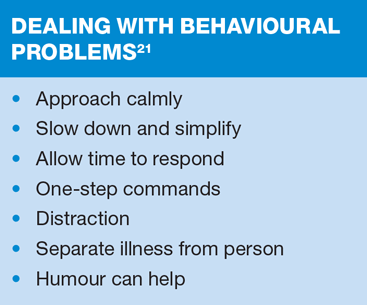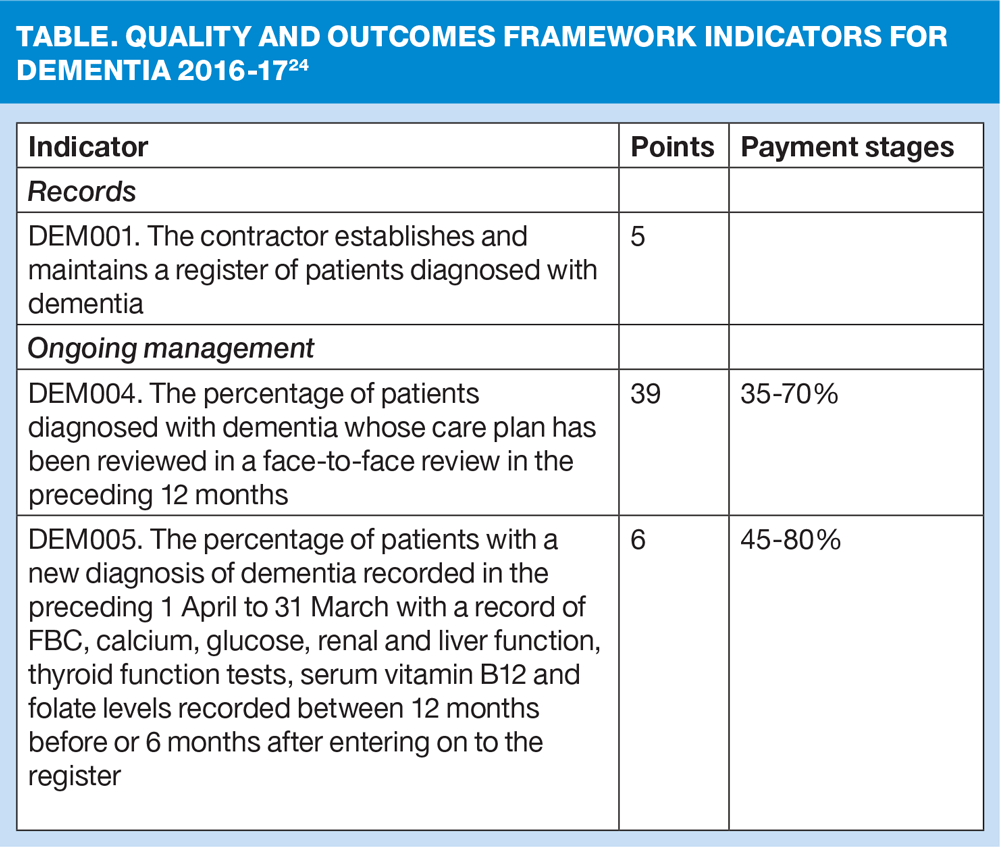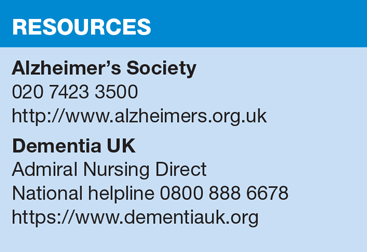Dementia
Dr Ed Warren
Dr Ed Warren
FRCGP, FAcadMEd
GP, Sheffield, GP trainer, Barnsely VTS
While warnings of the future prevalence may have overstated the case, dementia remains a common condition. From screening to supporting patients with a diagnosis of dementia – and their carers – general practice nurses have active involvement in this distressing condition
Dementia is a group of symptoms, not an illness (there are several causes of dementia) lasting more than 6 months and affecting 3 aspects of mental function:1
- Cognitive dysfunction, resulting in problems with memory, language, attention, thinking, orientation, calculation, and problem-solving.
- Psychiatric and behavioural problems, such as changes in personality, emotional control, social behaviour, depression, agitation, hallucinations, and delusions.
- Difficulties with activities of daily living, such as driving, shopping, eating, and dressing.
The Alzheimer’s Society2 estimates that there are 800,000 people in the UK with dementia (only 40% of whom have been diagnosed), but that previous projections about further increases may not be as bad as once feared, possibly because of improved healthcare, living standards and education. The risk of dementia depends heavily on age and roughly doubles every 5 years, so that 25% of the over 95s are affected.
A third of people with dementia are severely affected, and it is not known what proportion of those only mildly affected will progress to severe dementia.3 Not everyone with dementia will get worse.
When a diagnosis of dementia has been made, the median survival time for women is 4.6 years and for men 4.1 years. Dementia of itself rarely causes death, but it is associated with other degenerative illnesses which do.4
Dementia care is costly, at over £26bn a year in the UK,2 more than the combined total for heart disease, stroke and cancer.5 This includes £4.3bn for the NHS; £10.3bn for social care; and £11.3bn in unpaid family care.2 Cognitive impairment is the main reason for long term institutional care.6
RECOGNISING DEMENTIA
The early identification of dementia is useful within limits. It may reduce the risk of psychological illness in the carers, and the early mobilisation of support services may avert a crisis where the person with dementia lives alone.7 It allows patients and their families to plan for the future, and also allows more time for the use of medications. However, it is important to be aware that sometimes people would prefer NOT to know that they are developing dementia.
The two thirds of people with dementia who are only mildly or moderately affected may well not be causing any great concern to their carers or medical advisers.
First presentation
On average it takes 18 months before a first presentation to a healthcare professional, and another 18 months before a diagnosis of dementia is confirmed.5
Typically, the first indication of dementia is when the carers raise concerns. Such an approach will not have been made without a great deal of soul-searching and thought, and the carer should be given a sympathetic hearing. The recognition that a loved one’s ‘mind is going’ is never easy, and neither is an admission by the carers that they are unable to cope. Carers are rarely wrong in their assessment, and establishing good relations at the outset leads to an improved therapeutic relationship. The co-operation of the carers will be vital for future care.
A person with dementia may be quite unaware of their declining abilities. It is therefore essential to get a description from the carers about what is happening. Commonly problems will arise with respect to:
- Difficulties at work (in those of working age) such as an unexpected dismissal
- A tendency to mislay items and forget appointments and names
- Failure to recognise people
- Getting lost when out alone
- Recent changes in family role, for instance if someone suddenly stops taking responsibility for the family finances because of lack of memory.
Others are fully aware that their memory is deteriorating. People who are in work of a demanding nature may be aware of their declining powers at an earlier stage.
In the more severely affected, memory complaints by patients are likely to suggest depression, but memory complaints by relatives correlate with dementia.8
WHAT SORT OF DEMENTIA?
There are a number of types of dementia (the commonest are listed below), and a number of other conditions which mimic dementia. Making a more detailed diagnosis than just ‘dementia’ is of practical importance since in some cases treatment is beneficial, and sometimes other linked conditions will also need management.
Alzheimer’s disease
Alzheimer’s disease is the most common cause of dementia in the UK, affecting with 400,000 patients, or around half of all those with dementia.9 In a further 20% of cases there is Alzheimer’s disease as well as vascular dementia.10 Alzheimer’s disease is mainly a disease of old age, but 18,000 patients are below retiring age, and it may be seen as early as the fourth decade,11(the original description by Alois Azheimer related to a woman aged 51).
In between 15% and 50% of cases there is thought to be an inherited predisposition for the illness,12 and in up to half of patients there is a family history.13
Alzheimer’s disease is characterised by an insidious onset and a gradual progression of symptoms.10 The most prominent cognitive deficit is of memory. Recent memory, such as recall for day-to-day events, deteriorates before memories accumulated from the past. Later there may be language problems and visuo-spacial difficulty. Frontal lobe features, such as loss of social skills, appear late. Delusions, hallucinations and aggression can occur, and these are particularly trying for the carers.
Of the non-cognitive features, depression is the most common and often occurs in the early stages of the disease.13 In addition, depression can mimic dementia, particularly when the person is caring for a partner with dementia or is living alone after bereavement.
Vascular dementia
This is the cause of about 25% of dementia, and is the result of reduced brain blood circulation.
In vascular dementia the intellectual deficit has a sudden onset and then progresses in a stepwise manner,10 as opposed to the gradual deterioration seen in Alzheimer’s disease. Each worsening may be associated with stroke-like symptoms such as unsteadiness, or weakness of a limb. There may be a history of hypertension, old stroke, or ischaemic heart disease.
The things that make people more at risk of vascular dementia also make people more at risk of Alzheimer’s disease and cardiovascular disease.14 It may one day be found that there is a circulation problem in both types of dementia
Age-associated memory impairment
This is a frequent though not universal finding among the elderly, especially those over 90 years. This is not dementia. The brain shrinks to 80% of its maximum size by age 90. There is an episodic inability to remember names and dates. The information can be remembered at other times, however, which means that there is a problem with memory retrieval rather than memory as such. This condition does not seem to get worse over time, and does not carry the mortality associated with Alzheimer’s disease.15
MANAGING DEMENTIA
Make the diagnosis
Concerns may well be expressed in the first instance to the general practice nurse. It is important to confirm impressions as the implications of the diagnosis are considerable, and dementia is a terminal illness.
NICE Clinical Knowledge Summaries (CKS) recommend a number of case-finding tests for dementia,1 but stress that none is diagnostic and that they are only useful as a way of determining who needs a specialist assessment. The Six Item Cognitive Impairment Test (6-CIT) has a sensitivity of 90% and a specificity of 100% at a score of 8. The Mini-Cog has a better sensitivity at 95% and does not depend on language or education, but involves messing around with bits of paper to draw clock faces. Details of both these tests can be found in the NICE/CKS guidance on dementia.1
At present, nobody in the UK is recommending screening for dementia (that is, testing people who do not have symptoms): the controversial Enhanced Service to carry out dementia screening in general practice on the elderly ceased to exist on 31 March 2016.
Specialist input
All patients with suspected dementia should be referred for specialist assessment. According to government policy all localities should have access to a Memory Clinic.16
Medication for dementia should be started only by specialists.1 Those with mild or moderate Alzheimer’s disease may benefit from an acetylcholinesterase inhibitor such as donepezil, galantamine or rivastigmine. The severely affected may benefit from memantine, as may those with moderate Alzheimer’s who are unable to take first line drugs.
More severe dementia gives rise to other management problems which may also benefit from specialist assessment and possibly inpatient care. In most parts of the country a multidisciplinary psychogeriatric team is available and they are in the best position to make a full assessment. Referral gives the patient and carers the chance to get used to new professionals, and also ensures that any extra services can be arranged at the right time to avoid a crisis.
If there has been referral to another medical professional, then there should also be a referral to Social Services. Advice on benefits is usually needed, and Social Services departments are the only route to accessing a number of supportive community services such as day care and home care.
Knowledge of available services by the carers of people with dementia may not be very good. In a survey from Dundee between a quarter and a third of carers were not aware of the community psychiatric nurse service, private domestic help, relatives’ support groups, health visitors, geriatricians and hospital respite care.17 In some parts of the country, but sadly not all, Admiral nurses (provided by Dementia UK) are a superb resource, supporting both patients and carers in their own homes.
Support the carers
Carer support is a priority identified by NICE/CKS. It is difficult to involve carers without having concerns about confidentiality. Carers need sufficient knowledge and understanding of the patient’s disease to support their caring work, but this may mean that they end up being better informed than the patient. Proper assessment and treatment cannot be imposed unless the degree of the dementia is such that the patient is a danger to themselves or others.18 Negotiating the path through these different constraints needs some careful ethical footwork.
The key players in the care of people with dementia are the informal carers. To them falls the physical strain of their caring duties, which will often involve long hours and sheer hard work. A quarter of carers dedicate over 20 hours a week, and 15% spend up to 50 hours a week.18 There is also the emotional strain of watching a loved one deteriorate intellectually so that they cease to be the person they were before. There will be loss of sociable conversation, continual questioning and demands for attention. Shouldering such a burden can only be described as heroic.
Respite care, day care or even permanent care may be required for the sake of the carer as much as the patient. Respite care delays institutionalisation, but does not help the carers feel any better.8
The essential role of the carer in the team should be recognised: carers should be given the same consideration and respect as other members of the primary healthcare team. Requests for services should be responded to promptly and without moaning. If a known carer attends the surgery, it is appropriate that they be seen with a minimum of delay to enable them to return to their caring duties.
Caring for people with dementia is stressful, and depression occurs in between 30% and 50% of carers.19 The carers are just as likely to be depressed as the patients. It is particularly hard to find the physical and emotional resources to care for a relative with dementia if you are feeling depressed yourself.
It may be understandable that the strain of caring for a relative with dementia can cause the carer to ‘snap’ but the risk of intention abuse should not be overlooked.20
Problem behaviour
Behavioural problems are seen in around 70% of people with dementia.21 The commonest presentations are agitation, aggression, wandering, shouting, disinhibition and sleep disturbance. Such symptoms are particularly difficult for carers to cope with, and are the single biggest factors leading to institutional care.
When non-pharmacological techniques have failed, but only when they have failed, medication may be needed.
Benzodiazepines (e.g. diazepam) tend to make cognitive impairment worse, even though they are very useful sedatives and are otherwise relatively free of side effects. (See box)
Medication
In the substantial proportion of patients with dementia who become depressed, antidepressant medication helps.22
Medications specific for Alzheimer’s disease are usually initiated in secondary care, but may subsequently be prescribed under a ‘shared care’ arrangement. The drugs do not confer huge benefits,1 and certainly cannot be considered as a ‘cure’. However anything is better than nothing. In some, the drugs have no effect, but neither are they free of side effects, which may include nausea, vomiting, headaches, cramps and fatigue.
Based on the trial evidence, if you give 100 people with mild to moderate Alzheimer’s disease treatment with an acetylcholinesterase inhibitor for 6 months,17 would be feeling better whether or not they took the drug; seven would improve because they took the drug; and 76 would stay the same or get worse despite taking the drug. As for side effects, of those same 100 people, eight would get intolerable side effects whether or not they took the drug; 10 would get intolerable side effects because of taking the drug; and 82 get no side effects whether they take the drug or not. 23
There is no specific treatment for vascular dementia, but vascular dementia is evidence of cerebro-vascular disease and should be managed accordingly.
Self-help groups
Health care and social care for people with dementia is most effective when provided in partnership with organisations in the private and voluntary sector.4 The Alzheimer’s Society, through its national organisation and 240 local groups provides practical support for 30,000 people every week, and the website and helpline handle 20,000 calls a year. Literature is produced for carers and patients, and also for professionals to encourage the recognition and improve the management of patients with the disease.
Unfortunately there is no evidence that carers’ support groups reduce the stress of caring or alter outcomes, even though they are generally perceived as being helpful.8
Driving
Patients with mild dementia may still drive. Since much mild dementia is unknown to healthcare professionals and is not recognised by patients, it can be assumed that many with mild dementia are in fact driving. Advancing cognitive impairment makes driving unsafe, as does any degree of visuo-spacial impairment.
The presence of dementia should be reported to the DVLA. Family members will usually be in agreement with this as many fear for their safety when being driven.
CONCLUSION
As in many other long-term conditions, the first point of contact for people with dementia – whether Alzheimer’s disease or vascular dementia – is often the general practice nurse who has a vital role in supporting both the patient and their carer through what can be a distressing and stressful time. Knowing what support and specialist services are available in your area, and ensuring that the carer is also cared for, are key components of the practice nurse’s role.
REFERENCES
1. NICE Clinical Knowledge Summaries. Dementia http://cks.nice.org.uk/dementia#!topicsummary
2. Alzheimer’s Society. Dementia 2014 report statisticshttps://www.alzheimers.org.uk/site/scripts/documents_info.php?documentID=341
3. Philp I. Challenges of dementia to the GP: five areas to attack. Geriatric Medicine1989;19(11):19-20.
4. Downs M and Bowers B. Caring for people with dementia. BMJ 2008;336:225-6.
5. Burns A, Illiffe S. Dementia. BMJ 2009;338:405-409
6. Melzer D, Ely M, Brayne C. Cognitive impairment in elderly people: population based estimate of the future in England, Scotland and Wales. BMJ 1997;315:462.
7. O’Neill K. Dementia: a practical approach. Update 1999;58:33-9.
8. North of England Evidence Based Dementia Guideline Development Group. North of England evidence based guidelines development project: guideline for the primary care management of dementia. BMJ 1998;317:802-8.
9. Kmietowicz Z. NICE approves drugs for Alzheimer’s disease. BMJ 2001;322:190
10. Coates T. Dementia. GP March 1 1996:55-9
11. Gray A, Fenn P. Alzheimer’s Disease: the burden of the illness in England. Health Trends 1993;25:31-7.
12. Kennedy A. Alzheimer’s. GP October 15 1993:35-42.
13. Rosser M. Alzheimer’s Disease. BMJ 1993;307:779-82.
14. Fottrell E. Preventing or delaying the effects of Alzheimer’s disease. Geriatric Medicine May 2008. 283-6.
15. O’Brien J T and Levy R. Age associated memory impairment. BMJ 1992;304:5-6.
16. NICE CG42. Dementia: supporting people with dementia and their carers in health and social care. 2006 (Updated 2016). https://www.nice.org.uk/guidance/cg42
17. Philp I, McKee K J, Meldrum P, et al. Community care for demented and non-demented elderly people: a comparison study of financial burden, service use, and unmet needs in family supporters. BMJ 1995;310:1503-6.
18. Bosanquet N. Alzheimer’s disease. Geriatric Medicine 1999;29(4):13-14.
19. Ballard CG, Eastwood C, Gahir M, et al. A follow up of depression in the carers of dementia sufferers. Br Med J 1996;312:947.
20. Cooper C, Selwood A, Livingston G. The prevalence of elder abuse and neglect: a systematic review. Age and Aging 2008;32(2):151-160
21. Baldwin AC, Rigby JC. Dementia: Management of behavioural problems. Geriatric Medicine 2001;31(4):61-4.
22. Drugs for disruptive features in dementia. Drug and Therapeutics Bulletin 2003;41(1):1-4
23. National Prescribing Centre. Condition specific decision aids: Dementia, 2009 (archived). Available at: http://allmanmedicinbd.se/wp-content/2012/11/pda_dementia.pdf
24. BMA, NHS England, NHS Employers. 2016/17 General Medical Services
(GMS) contract Quality and Outcomes Framework (QOF). Guidance for GMS contract 2016/17 April 2016
Related articles
View all Articles


